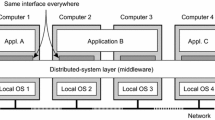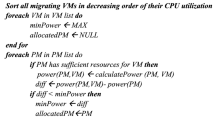Abstract
This paper presents a new state-tracking migration scheme that is integrated with aggressive reservation strategies such as immediate restart, greedy backfilling and selective preemption. The main contribution of this paper is an analysis of the effects of three techniques that can be used beyond the conventional migration schemes. Our simulation results suggest that state-tracking migration with selective preemption entirely outperforms the others. We also observe that the overall performance of immediate restart strategy combining to migration can be stably maintained under various job lifetime distributions. Moreover, it is found that performance would be improved by fitting jobs ruled by the immediate restart strategy rather than queued jobs into the void-intervals under the state-tracking migration scheme.











Similar content being viewed by others
References
Zomaya, A.Y., Teh, Y.-H.: Observations on using genetic algorithms for dynamic load-balancing. IEEE Trans. Parallel Distrib. Syst. 12(9), 899–911 (2001)
Buyya, R., Abramson, D., Giddy, J.: Nimrod/g: an architecture for a resource management and scheduling system in a global computational grid. In: Proc. of the HPC ASIA 2000, pp. 283–289 (2000)
Xiong, Y., Vandenhoute, M., Cankaya, H.C.: Control architecture in optical burst-switched WDM networks. IEEE J. Sel. Areas Commun. 18, 1838–1851 (2000)
Iizuka, M., Sakuta, M., Nishino, Y., Sasase, I.: A scheduling algorithm minimizing voids generated by arriving bursts in optical burst switched WDM network. In: Proc. of IEEE GLOBECOM 2000, pp. 2736–2740 (2000)
Zhao, W., Ramamritham, K., Stankovic, J.A.: Preemptive scheduling under time and resource constraints. IEEE Trans. Comput. C-36(8), 949–960 (1987)
Chiang, S.H., Vernon, M.K.: Production job scheduling for parallel shared memory systems. In: Proc. of Int. Parallel and Distributed Processing Symp. (2002)
Parsons, E.W., Sevcik, K.C.: Implementing multiprocessor scheduling disciplines. In: Feitelson, D.G., Rudolph, L. (eds.) Proc. of Job Scheduling Strategies for Parallel Processing (IPPS’97), pp. 166–192. Springer, London (1997)
Ruscio, J.F., Heffner, M.A., Varadarajan, S.: DejaVu: transparent user-level checkpointing migration and recovery for distributed systems. In: IEEE Int. Parallel and Distributed Processing Symp. (2007)
Baker, K.R., Trietsch, D.: Principles of Sequencing and Scheduling. Wiley, New York (2009)
Moon, Y.-H., Youn, C.-H.: Integrated approach towards adaptive state-tracking job migration for maximising performance benefit. IEE Electron. Lett. 46(25), 1659–1661 (2010)
Song, S., Hwang, K., Kwok, Y.: Risk-resilient heuristics and genetic algorithms for security-assured grid job scheduling. IEEE Trans. Comput. 55(6), 703–719 (2006)
Rodríguez, G., Pardo, X.C., Martín, M.J., González, P.: Performance evaluation of an application-level checkpointing solution on grids. Future Gener. Comput. Syst. 26(7), 1012–1023 (2010)
Mu’alem, A.W., Feitelson, D.G.: Utilization, predictability, workloads, and user runtime estimates in scheduling the IBM SP2 with backfilling. IEEE Trans. Parallel Distrib. Syst. 12(6), 529–543 (2001)
Gonzalez Pico, C.A., Wainwright, R.L.: Dynamic scheduling of computer tasks using genetic algorithms. In: Evolutionary computation, 1994. IEEE World Congress on Computational Intelligence, Proc. of the First IEEE Conference on, vol. 2, pp. 829–833 (1994)
Logs of Real Parallel Workloads: http://www.cs.huji.ac.il/labs/parallel/workload/logs.html (2011)
Albert, E., Arenas, P., Gnaim, S., Herraiz, I., Puebla, G.: Comparing cost functions in resource analysis. In: Proc. of the Int. Conference on Foundational and Practical Aspects of Resource Analysis (FOPARA) (2009)
Acknowledgements
This research was supported by Next-Generation Information Computing Development Program through the National Research Foundation of Korea (NRF) funded by the Ministry of Education, Science and Technology (No. 2011-0020522).
Author information
Authors and Affiliations
Corresponding author
Rights and permissions
About this article
Cite this article
Moon, YH., Youn, CH. An integrated approach towards aggressive state-tracking migration for maximizing performance benefit in distributed computing. Cluster Comput 16, 367–378 (2013). https://doi.org/10.1007/s10586-011-0197-0
Received:
Accepted:
Published:
Issue Date:
DOI: https://doi.org/10.1007/s10586-011-0197-0




